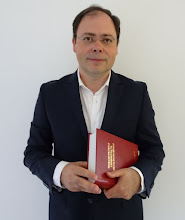domingo, 31 de janeiro de 2010
sábado, 30 de janeiro de 2010
Campo eléctrico
Postado por José Jorge da Silva Teixeira às 00:58 0 comentários
Marcadores: 12 - Electricidade e electromagnetismo
sexta-feira, 29 de janeiro de 2010
Conservação da carga eléctrica
Postado por José Jorge da Silva Teixeira às 00:32 0 comentários
Marcadores: 12 - Electricidade e electromagnetismo
quinta-feira, 28 de janeiro de 2010
Qué son los condensadores
Postado por José Jorge da Silva Teixeira às 00:28 0 comentários
Marcadores: 12 - Electricidade e electromagnetismo
quarta-feira, 27 de janeiro de 2010
Electrostática
Postado por José Jorge da Silva Teixeira às 00:55 0 comentários
Marcadores: 12 - Electricidade e electromagnetismo
segunda-feira, 25 de janeiro de 2010
Animações no domínio do electromagnetismo
1- Campo eléctrico de uma esfera carregada; 2- Campo eléctrico de um dipolo; 3- Campo eléctrico de um anel de carga; 4- Fluxo do campo eléctrico (carga pontual); 5- Fluxo do campo eléctrico (plano de carga); 6- Fluxo do campo eléctrico (linha de carga); 7- Regra da mão direita; 8- Campo magnético de uma espira (regra da mão direita); 9- Campo magnético de uma corrente rectilínea; 10- Campo magnético de um conjunto de espiras paralelas; 11- Campo magnético de um solenóide; 12- Campo magnético de um solenóide toroidal; 13- Campo magnético de um solenóide toroidal; 14- Campo magnético de uma carga pontual em movimento; 15- Força magnética numa carga em movimento; 16- Partícula carregada num campo magnético uniforme; 17- Partícula carregada num campo magnético uniforme; 18- Partícula carregada num campo magnético toroidal; 19- Garrafa magnética 1; 20- Garrafa magnética 2; 21- Campo magnético terrestre; 22- Motor eléctrico de corrente contínua; 23- Motor eléctrico de corrente contínua; 24- Fluxo do campo magnético através de uma espira; 25- Lei de Lenz
Postado por José Jorge da Silva Teixeira às 00:46 0 comentários
Marcadores: 12 - Electricidade e electromagnetismo
sábado, 23 de janeiro de 2010
Poder das pontas
Postado por José Jorge da Silva Teixeira às 01:00 0 comentários
Marcadores: 12 - Electricidade e electromagnetismo
quinta-feira, 21 de janeiro de 2010
Lei de Coulomb
Postado por José Jorge da Silva Teixeira às 00:57 0 comentários
Marcadores: 12 - Electricidade e electromagnetismo
terça-feira, 19 de janeiro de 2010
Como medir um raio?
Postado por José Jorge da Silva Teixeira às 00:36 0 comentários
Marcadores: 12 - Electricidade e electromagnetismo
domingo, 17 de janeiro de 2010
Como um pássaro num fio eléctrico
Postado por José Jorge da Silva Teixeira às 00:37 0 comentários
Marcadores: 12 - Electricidade e electromagnetismo
sexta-feira, 15 de janeiro de 2010
O Modelo Padrão
Postado por José Jorge da Silva Teixeira às 23:23 0 comentários
Marcadores: 12 - Electricidade e electromagnetismo
quinta-feira, 14 de janeiro de 2010
Como é que é possível ver um buraco negro?
Postado por José Jorge da Silva Teixeira às 15:06 0 comentários
terça-feira, 12 de janeiro de 2010
Sistema heliocentrico de Galileu
Postado por José Jorge da Silva Teixeira às 15:00 0 comentários
Marcadores: 12 - Mecânica
segunda-feira, 11 de janeiro de 2010
Porque será que a Lua não cai?
Postado por José Jorge da Silva Teixeira às 15:07 0 comentários
Marcadores: 12 - Mecânica
sábado, 9 de janeiro de 2010
O que origina as marés?
Postado por José Jorge da Silva Teixeira às 15:03 0 comentários
Marcadores: 12 - Mecânica
quinta-feira, 7 de janeiro de 2010
O Mistério das Marés.
No doubt you've sat by the ocean's edge and wondered why the tides move in and out. Come on in and see why. The water's fine.
http://www.co-ops.nos.noaa.gov/restles3.html
Postado por José Jorge da Silva Teixeira às 14:55 0 comentários
Marcadores: 12 - Mecânica
terça-feira, 5 de janeiro de 2010
Leis de Kepler
Postado por José Jorge da Silva Teixeira às 15:12 0 comentários
Marcadores: 12 - Mecânica
segunda-feira, 4 de janeiro de 2010
Cavendish Experiment
Postado por José Jorge da Silva Teixeira às 15:16 0 comentários
Marcadores: 12 - Mecânica
domingo, 3 de janeiro de 2010
Uma viagem através do centro da Terra
Watch all new episodes of NOVA scienceNOW every Wednesday night this summer at 9pm on PBS, starting Wednesday June 25. Learn more at: http://www.pbs.org/novasciencenow
Funding for NOVA scienceNOW is provided by Pfizer, the National Science Foundation, the Howard Hughes Medical Institute, the Alfred P. Sloan Foundation, and public television viewers.
Postado por José Jorge da Silva Teixeira às 14:48 0 comentários











